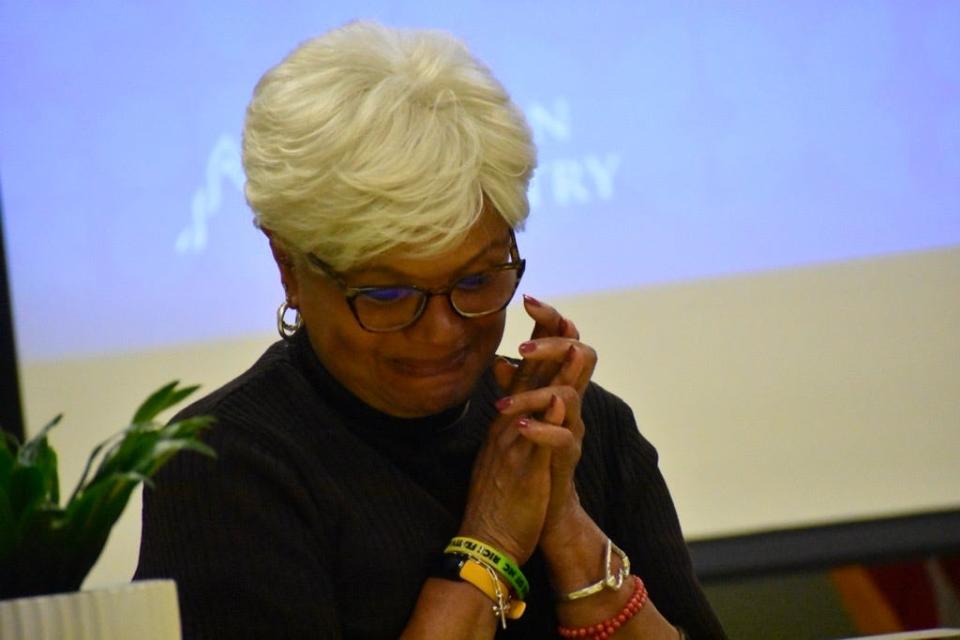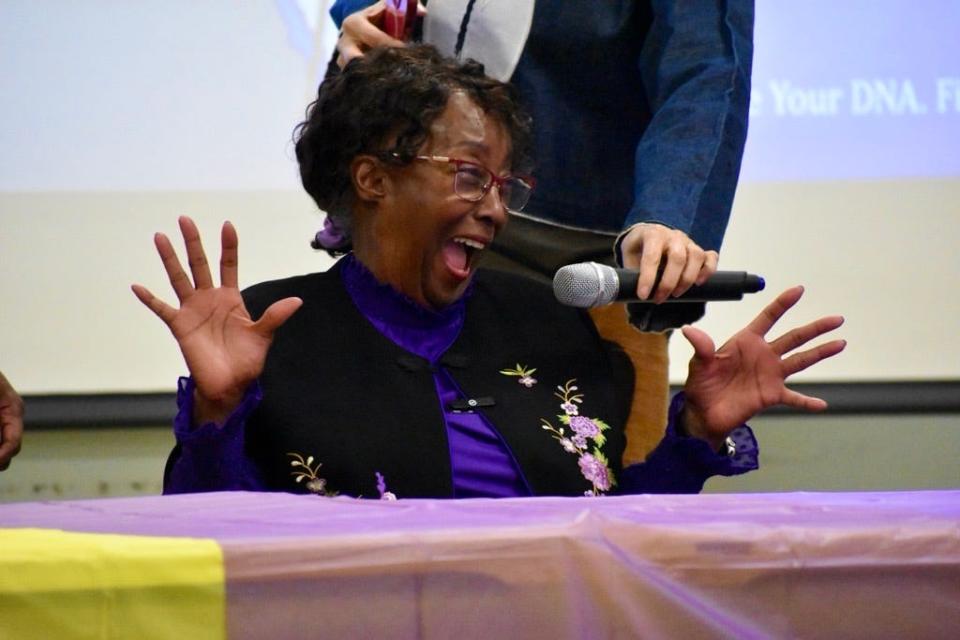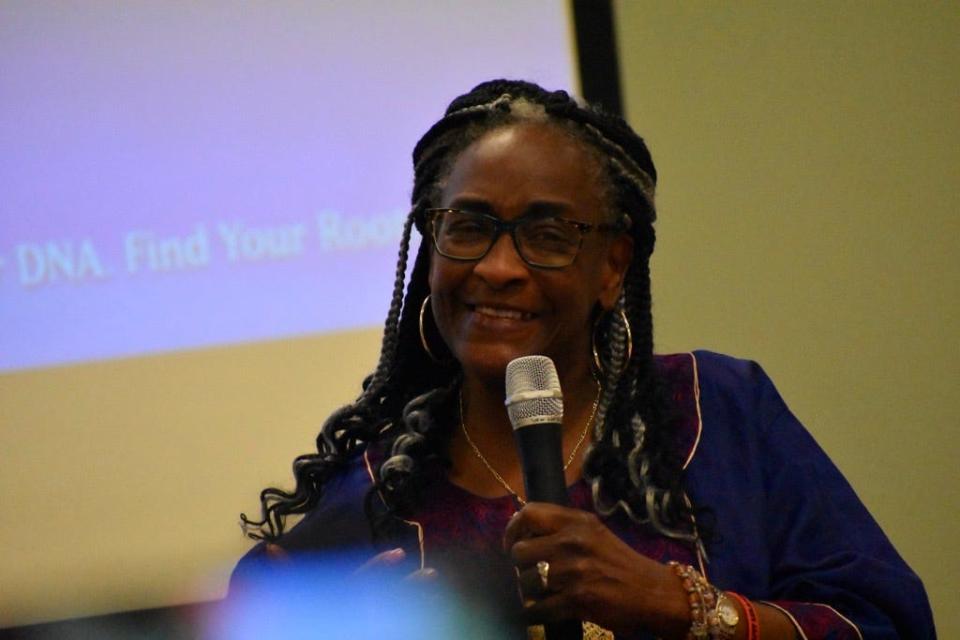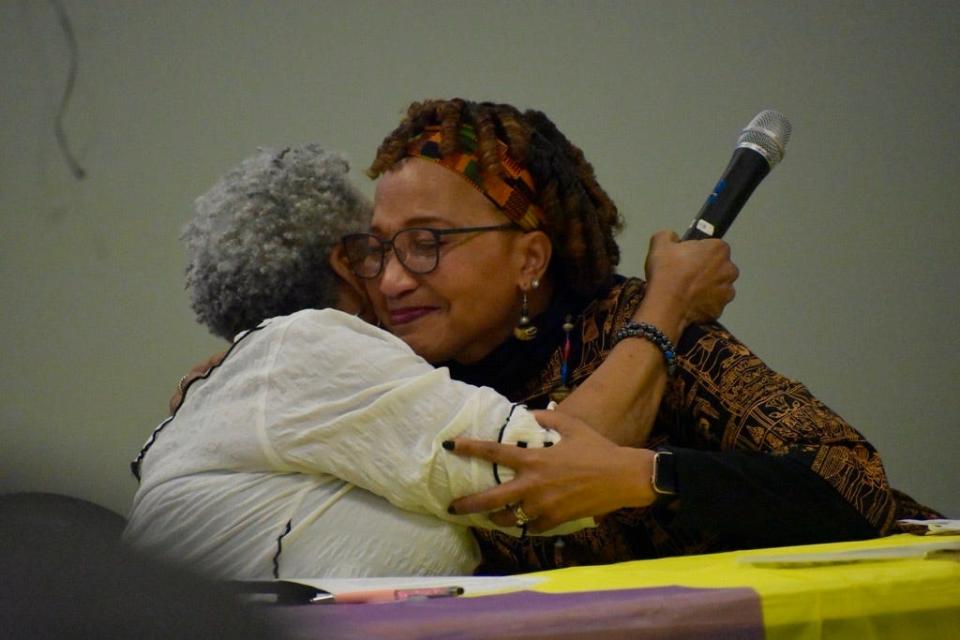In 'an act of freedom', Brunswick County residents discover African ancestry
Residents in northern Brunswick County are finding healing, freedom and connection by tracing their ancestry back to the beginning.
As part of the 2024 N.C. Rice Festival, five Brunswick County residents had their DNA tested and traced back to the African countries and tribes they are descendant from. The event took place in late February and provided area residents with answers they’ve longed for.
Gina Paige, a geneticist, businesswoman and co-founder of African Ancestry, Inc., said Black Americans have been without their family, heritage and homes since the 1600s, and ancestry research is finally catching up.
“As Black people, we are the original victims of identity theft,” Paige said. “I say that because when our ancestors… were taken from the shores of West and Central Africa and brought to the Caribbean and North America and South America, we lost everything that identified us. Every single thing.”
When Africans were enslaved, they were stripped of their names, languages, cultures and families, Paige said. Like victims of typical identity fraud, Paige said, Black Americans have been working to reclaim their names and ways of life since 1619.
Hitting a wall when tracing African ancestry
Tracing ancestry and heritage has become commonplace with increased access to information through companies such as Utah-based Ancestry.com, the largest for-profit genealogy company in the world, and California-based 23andMe, a personal genomics and biotechnology company.
For Black Americans, Paige said, there is often a “brick wall” that is hit when attempting written genealogy research, as little was documented and preserved through the slave trade.
Genetic ancestry tracing, she said, has become a way to compliment genealogy research when that wall is hit. Paige’s company – African Ancestry – uses DNA and its comprehensive database of indigenous African genetic sequences to trace ancestry back to a specific, present-day African country and ethnic group of origin. The test goes back between 500 to 2,000 years, producing a definitive answer of ancestry before the transatlantic slave trade, Paige said.
African Ancestry is working to close the gap people of African descent by providing a larger African DNA database compared to other popular genetic ancestry companies.
Paige said Ancestry.com has fewer than 2,000 African DNA samples in its database, representing only nine African countries and a handful of ethnic groups. 23andMe, she said, has around 4,300 African DNA samples, representing 19 countries and 37 ethnic groups.
The database for African Ancestry has more than 33,000 African DNA samples, representing 35 African countries and 161 ethnic groups.
Related coverage: With passing of NC Rice Festival chair, event marches on to honor his legacy
The results are in
Five Brunswick County residents had their ancestries traced back and discovered what countries and tribes they came from. For Annie Nelson, it was her three grandchildren – bugging her to write her life story – who motivated her to take the test.
“I’m doing it for my grandkids,” she said.
Nelson’s maternal ancestry was traced to the Yoruba tribe of present-day Nigeria, Paige said. The Yoruba people are known for being highly spiritual and religious, Paige said. The results garnered an emotional response from Nelson, whose eyes welled with tears as her results were read.

Nelson said she felt the pieces connecting in real time, particularly identifying with the news that she comes from a spiritual group. At 70, Nelson became an ordained minister, a pinnacle of her lifetime of increased spirituality. Her son, she said, has been on a “spiritual path” through his lifetime, and her mother was named after a goddess.
“I’m in awe, actually,” Nelson said.
Terry Lee Dismore was the only one of the five women whose ancestry was not traced to an African country, but – to her surprise – a European one. Dismore’s cousin said he’s tried tracing the family’s genealogy through oral and written records, finding some white family members.
The DNA result seemingly corroborated the genealogy research.

Dismore’s maternal DNA was traced back to present-day Finland, Norway, Estonia and Russia. Paige said she kept digging, connecting Dismore’s ancestry to France, Spain and, finally, North Africa. Paige said the European result was likely connected with a migration of West African people to Europe, some 50,000 years ago.
Wanda Wills said her lack of knowledge about her family’s ancestry motivated her to take the test.
“I come from one of those families where a lot of our lineage and heritage is kind of surrounded in secrecy,” Wills said. “Maybe from embarrassment about it.”

Wills said her family had an attitude of wanting to focus on “who we present today,” rather than knowing their past.
“But that’s not all of who we are,” she said.
Wills’ DNA was traced to the Tikar and Hausa tribes of present-day Cameroon.
“Maybe as I present it to my family members, we can find some strength and some clarity and some love connected with who we really are,” Wills said.
Janyce Jones and Rebecca Hixon discovered they shared a similar heritage. Both women’s DNA was traced back to present-day Sierra Leone and the Mende tribe. Sierra Leone is the first and only country to offer citizenship based on African Ancestry DNA results, Paige said. The women shared an emotional embrace following the reading of the results.

“Cousin – I just know that there is already a family connection between the two of us,” Jones said.
Finding healing, resistance and freedom
Black Americans and their ancestors “never thought that they’d see home again,” Paige said.
“We know that we can travel to Africa, but we travel to Africa without knowing which one of those 54 countries is our home, which one of those thousands of ethnic groups is our connection,” she said.
Finding these answers provides information and clarity to Black Americans who would otherwise remain unaware of their specific heritage.
“Tracing your African ancestry roots is an act of healing,” Paige said. “It’s also an act of resistance, because we’re not supposed to know… and then it’s also an act of freedom.”
Eulis A. Willis, longtime Navassa mayor, said the N.C. Rice Festival, and events like the ancestry reveal, work to honor and reclaim the area’s past while looking toward the future.
“The reason why we’re here is because of those West Africans that came over back in Antebellum days and worked over here,” Willis said. “Workforce development in Western Africa during the late 17th and early 18 centuries caused economic development in this area. Today, because of economic development in the Cape Fear area, namely Navassa, is being created by the restoring to productive use the land that got injured when those Africans came and had to find places to work… We now have the opportunity for workforce development for the formerly enslaved descendants that will create fair and just economic development for all… We flipped the script.”
STAY CONNECTED: Keep up with the area’s latest Brunswick County news by signing up for the Brunswick Today newsletter and following us on Facebook and Instagram.
The ancestry reveal event has been part of the N.C. Rice Festival for since 2022. African Ancestry offers various DNA testing kits, learn more on their website, africanancestry.com.
Jamey Cross covers Brunswick County for the StarNews. Reach her at jbcross@gannett.com or message her on Twitter/X @jameybcross.
This article originally appeared on Wilmington StarNews: African Ancestry Inc. helps Brunswick, NC residents trace heritage

